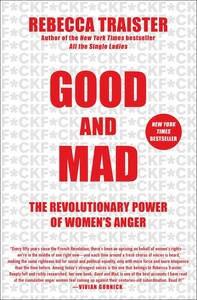Take a photo of a barcode or cover
There is so much to be absolutely furious about in the world these days, particularly as a women, so this felt like an extremely timely read and I found it weirdly comforting to read about how the anger and fury of women has changed--and is changing--the world. However, while I LOVED Traister's previous book All the Single Ladies , I frequently felt like this one didn't quite go far enough to tell the historical backstory (it felt very 2016 focused, which makes sense given this moment, but I wanted more than #metoo and Clinton) and it felt slightly underdone to me. That being said, I appreciated how frequently the intersectionality of the anger experienced by black women and women of color more broadly was brought to the forefront and how Traister gave these women the proverbial mic. It made for both a more nuanced read and a more believable argument about women's revolutionary rage. 3.5/5 stars.
If you're staying away from this book because you feel like you already have so much rage and you don't need or want to foment more, DON'T! This book does an excellent job of recognizing women's rage, its recent causes and outlets, and it highlights ways that female rage has already been a powerful tool for change. But, at least for me, it didn't make me additionally ragey.
Also, if I'm incredibly honest, there have been times since the 2016 election cycle when I've felt a bit like a fraudulent feminist because for much of my adult life, I was so incredibly naive--both about the state of power dynamics in this country and my own place of privilege within it. And this book recognizes (without absolving anyone) that 2016 was a wake up call for a lot of women (especially white women), who now feel like completely different people.
What can I say, Rebecca Traister's writing always makes me think but also feel seen.
Also, if I'm incredibly honest, there have been times since the 2016 election cycle when I've felt a bit like a fraudulent feminist because for much of my adult life, I was so incredibly naive--both about the state of power dynamics in this country and my own place of privilege within it. And this book recognizes (without absolving anyone) that 2016 was a wake up call for a lot of women (especially white women), who now feel like completely different people.
What can I say, Rebecca Traister's writing always makes me think but also feel seen.
Hell yeah, I'm fucking mad. I'll never apologize for it, so don't expect one. Review to come.
I thought this did a fantastic job of putting the current movements into a historical context. It was both validating and informative, not to mention reaffirming.
It took me a long time to overcome my preconceptions when reading this book. I came into thinking that, while it is unfair and unequal for women's anger to be quashed while men's is often celebrated, I would rather that *everyone* were less angry, rather than encouraging women's anger. This is not to say that people don't have valid reasons to be angry, but I came into the book considering anger to be pretty negative.
Traister addresses this throughout, and especially in the conclusion, where she basically explains that anger itself is not corrosive, but its repression (internally and externally) is. That made a lot of sense to me, as did her recommendation to "acknowledg[e], pay[] attention to, respect[], and not shy[] away from *other* women's anger." That in itself was valuable.
I also appreciated the intersectionality of the book. I've often heard about the undervaluation of the work, historically and presently of WoC (as Traister pointed out, the nyt highlighted "tensions" within the Women's March around this topic), but this book broke it down in such a simple way: white women benefit from white supremacy due to proximity to white men.
I would have appreciated a taxonomy of anger, because there are a lot of complex emotions here that aren't fleshed out (although the acceptability of women's sadness instead of anger was discussed), and I could have done without a lot of the direct quotes (but it's important to cite those in the book of course). In short, it felt a little rushed and all over the place, but Traister discusses the urgency she felt in writing this book, and it gave me a lot to think about, especially that anger disrupts the status quo and who and what promotes the status quo.
The book also made me reread Audre Lorde's "The Uses of Anger," which is certainly a good thing!
Traister addresses this throughout, and especially in the conclusion, where she basically explains that anger itself is not corrosive, but its repression (internally and externally) is. That made a lot of sense to me, as did her recommendation to "acknowledg[e], pay[] attention to, respect[], and not shy[] away from *other* women's anger." That in itself was valuable.
I also appreciated the intersectionality of the book. I've often heard about the undervaluation of the work, historically and presently of WoC (as Traister pointed out, the nyt highlighted "tensions" within the Women's March around this topic), but this book broke it down in such a simple way: white women benefit from white supremacy due to proximity to white men.
I would have appreciated a taxonomy of anger, because there are a lot of complex emotions here that aren't fleshed out (although the acceptability of women's sadness instead of anger was discussed), and I could have done without a lot of the direct quotes (but it's important to cite those in the book of course). In short, it felt a little rushed and all over the place, but Traister discusses the urgency she felt in writing this book, and it gave me a lot to think about, especially that anger disrupts the status quo and who and what promotes the status quo.
The book also made me reread Audre Lorde's "The Uses of Anger," which is certainly a good thing!
After waking early on November 9, 2016 to learn that a man who boasted about sexually assaulting women had been elected to be the next POTUS, the force of my fury left me so tongue-tied and twisted that all I could do was sob. Thank you, Rebecca Traister, for articulating the rage I’ve felt ever since—rage I’ve been tamping down my entire life to make my feminism more palatable to men. I needed this book!
“We must come to recognize—those of us who feel anger, who have in our lives taken pains to disguise it, who worry about its ill effects, who rear back from it and try to tamp it down in ourselves for fear that letting it out will hurt our goals—that anger is often an exuberant expression. It is the force that injects energy, intensity, and urgency into battles that must be intense and urgent if they are to be won. More broadly, we must come to recognize our own rage as valid, as rational, and as not what we are told it is: ugly, hysterical, marginal, laughable.” ~ Rebecca Traister
“…I no longer believe that it is anger that is hurting us, but rather the system that penalizes us for expressing it, that doesn’t respect or hear it, that isn’t curious about it, that mocks or ignores it. That’s what’s making us sick; that’s what’s making us feel crazy, alone; that’s why we’re grinding our teeth at night.” ~ Rebecca Traister
“We must come to recognize—those of us who feel anger, who have in our lives taken pains to disguise it, who worry about its ill effects, who rear back from it and try to tamp it down in ourselves for fear that letting it out will hurt our goals—that anger is often an exuberant expression. It is the force that injects energy, intensity, and urgency into battles that must be intense and urgent if they are to be won. More broadly, we must come to recognize our own rage as valid, as rational, and as not what we are told it is: ugly, hysterical, marginal, laughable.” ~ Rebecca Traister
“…I no longer believe that it is anger that is hurting us, but rather the system that penalizes us for expressing it, that doesn’t respect or hear it, that isn’t curious about it, that mocks or ignores it. That’s what’s making us sick; that’s what’s making us feel crazy, alone; that’s why we’re grinding our teeth at night.” ~ Rebecca Traister





